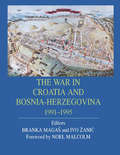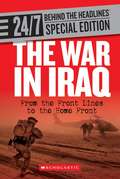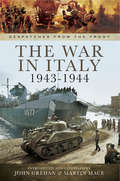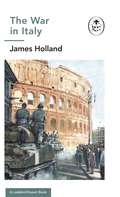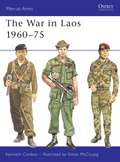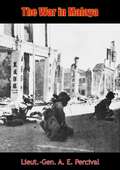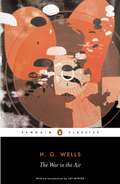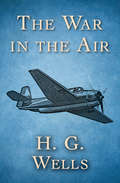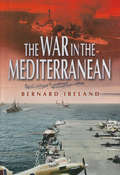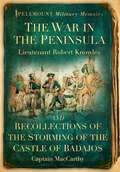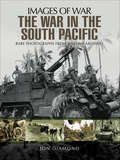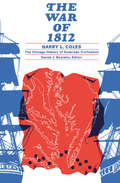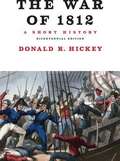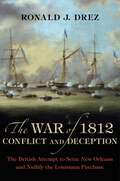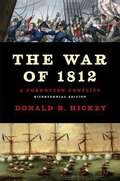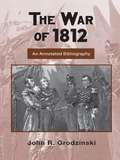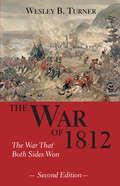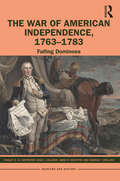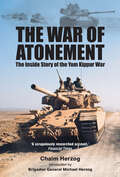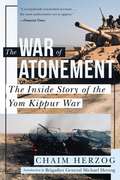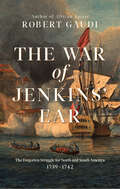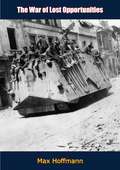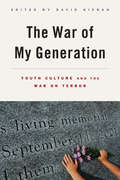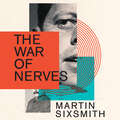- Table View
- List View
The War in Croatia and Bosnia-Herzegovina 1991-1995
by Branka Magas Ivo ZanicThis work provides an understanding of the wars in Croatia and Bosnia-Herzegovina. These two interdependent wars were the greatest armed conflicts in Europe in the second half of the 20th century. This work provides an analysis of their successes and failures.
The War in Iraq: From the Front Lines to the Home Front
by Franklin Watts StaffWill The U.S. Go To War With Iraq? That was the question in September 2002, when U.S. President George W. Bush appeared before world leaders. Bush demanded that Iraqi leader Saddam Hussein destroy his weapons of mass destruction--or else. So what happened? The Iraq War began six months later, on March 19, 2003. Why did the war begin? Why have troops been there for so long? Read on to follow the war in Iraq as it unfolded--and as Scholastic's magazines reported it.
The War in Italy, 1943–1944 (Despatches From The Front Ser.)
by Martin Mace John GrehanDespatches in this volume include that on the Conquest of Sicily from 10 July 1942 to 17 August 1943 by Field-Marshall Viscount Alexander of Tunis; the despatch on the invasion of Sicily in July 1943, by Admiral of the Fleet Sir Andrew B. Cunningham, Commander-in-Chief, Mediterranean; despatch on naval operations in connection with the landings in the Gulf of Salerno in September 1943, by Admiral of the Fleet Sir Andrew B. Cunningham; and the despatch on operations of the Allied Armies between September 1943 and December 1944, by Field Marshal the Viscount Alexander of Tunis.This unique collection of original documents will prove to be an invaluable resource for historians, students and all those interested in what was one of the most significant periods in British military history.
The War in Italy: (WW2 #8) (The Ladybird Expert Series #14)
by James Holland* PRE-ORDER YOUR COPY NOW *- Why did the Allies decide to invade Southern Italy?- How did the weather and Italian terrain complicate the fighting?- How did General Mark Clark's Allied Armies win the final battle?Discover the mounting conflict and complex campaigns of the war in Italy. From Operation HUSKY to Clark's final offensive, the Allied campaign tightened the noose around Nazi Germany and saw the end of Italian Fascism, though it was at a cost of high civilian casualty and destruction.AN EPIC OF GRIT, DETERMINATION AND SACRIFICEWritten by historian, author and broadcaster James Holland and with immersive illustrations by Keith Burns, THE WAR IN ITALY 1943-1945 is an accessible and enthralling introduction to these critical battles and their impact on the outcome of World War II
The War in Laos 1960-75
by Kenneth Conboy Simon MccouaigAs World War II drew to a close, the Imperial Japanese military seized control of Laos, a French protectorate, and encouraged nationalist movements to forestall the revival of French power in the region. Despite these efforts the French re-entered Indochina and methodically retook the protectorate. By 1957, the government of Laos and the core of the Communist Laotian forces, known as the Pathet Lao, entered an uneasy truce, which plunged the country into 15 years of war. This text explores the resulting war, providing a summary of events and profiling the Laotian government forces, the government Allied forces and the Communist forces.
The War in Malaya
by Lieut.-Gen. Arthur Ernest PercivalArthur Ernest Percival, the General commanding in Malaya at the time of the catastophic events of 1941 and 1942, gives his authoritative account of the campaign.“THE fall of Singapore on 15 February 1942 was a great shock both to Britain and to her Allies. The shock was all the greater because the public generally had been led to believe that Singapore was impregnable. Accusations against our leaders, both military and civil, were made in our own country and abroad, and there were wild stories about the conduct of our fighting men and of the civil population. Many of the statements made and many of the opinions expressed were based on false or incomplete information. Some of them were founded on inadequate knowledge of Malayan conditions or of the factors which influenced decisions. Others were “last survivor” stories. I have hitherto made no effort to refute these accusations or to deny these stories. Some of my friends have wondered why. I felt that it would be better to concentrate on producing the true story and that it is due to all those who fought in Malaya and Borneo, and to the non-combatants who played their part and suffered equally with the fighting men, that I should record the knowledge which I alone possess. So that is why I have written this book.“It would have been easy for me, in the charged atmosphere which still surrounds the fall of Singapore, to have written a sensational story. It would have been equally easy to have written an apologia. I have tried to avoid both these pitfalls...I have tried, therefore, in this book to give, as concisely as I can, a picture of those events as they are known to me and to explain why certain decisions were taken and the factors which influenced them. I have assumed that the great majority of my readers have little or no knowledge of the Far East, so I have tried to introduce them to the conditions which prevailed there at the time of which I write. I hope I have not been unsuccessful.”—Foreword
The War in Their Minds: German Soldiers and Their Violent Pasts in West Germany
by Philip Schmitz Svenja GoltermannHistorians are increasingly looking at the sacrifices Germans had to make during World War II. In this context, Svenja Goltermann has taken up a particularly delicate topic, German soldiers' experience of violence during the war, and repercussions of this experience after their return home. Part I of her book explores the ways in which veterans' experiences of wartime violence reshaped everyday family life, involving family members in complex ways. Part II offers an extensive analysis of the psychiatric response to this new category of patient, and in particular the reluctance of psychiatrists to recognize the psychic afflictions of former POWs as constituting the grounds for long-term disability. Part III analyzes the cultural representations of veterans' psychic suffering, encompassing the daily press, popular films, novels, and theater. Originally published in German as Die Gesellschaft der Uberlebenden, The War in Their Minds examines hitherto unused source material--psychiatric medical files of soldiers--to make clear how difficult it was for the soldiers and their families to readjust to normal, everyday life. Goltermann allows these testimonies of violence, guilt, justification, and helplessness speak for themselves and sensitively explores how the pension claims of returning soldiers were to compete with the claims of the Holocaust victims to compensation.
The War in the Air
by H. G. WellsFollowing the development of massive airships, naïve Londoner Bert Smallways becomes accidentally involved in a German plot to invade America by air and reduce New York to rubble. But although bombers devastate the city, they cannot overwhelm the country, and their attack leads not to victory but to the beginning of a new and horrific age for humanity. And so dawns the era of Total War, in which brutal aerial bombardments reduce the great cultures of the twentieth century to nothing. As civilization collapses around the Englishman, now stranded in a ruined America, he clings to only one hope - that he might return to London, and marry the woman he loves.
The War in the Air: Revised Edition Of Original Version (The\world At War Ser.)
by H. G. WellsModern warfare takes to the skies in this novel by a master of science fiction and fantasy. In 1907, young Bert Smallways, a brilliant mechanist and accidental aeronaut, finds himself a reluctant stowaway upon the very same airship that will begin the Great War. Soon, Smallways is swept away aboard the Vaterland, the flagship piloted by a belligerent German prince, whose mastery of technology heralds a new age of war that takes to the sky. Filled with petrol-powered war machines, ironclads, bombardments, and espionage, The War in the Air prophesied methods of warfare that would only develop later in the twentieth century. A cornerstone of early science fiction, this exciting tale is H. G. Wells at his best. This ebook has been professionally proofread to ensure accuracy and readability on all devices.
The War in the Mediterranean
by Bernard IrelandMuch has been written about the conduct of the land battles and the commanders who faced each other yet, as the main protagonists realised at the time, success or failure rested on the effectiveness of their seaborne supply chain. Control of the Mediterranean was therefore absolutely crucial. In the final analysis it was the Allies' ability to dominate the Mediterranean that bought them victory but there is no denying that it was a 'damned close run thing'. In this authoritative study, Bernard Ireland brings a fresh clarity to the complexities and factors at play during this critical period.
The War in the Peninsula and Recollections of the Storming of the Castle of Badajos: Some Letters of a Lancashire Officer
by Ian Fletcher Robert Knowles Captain MacCarthy MacCarthyLieutenant Knowles served in the 7th (Royal) Fusiliers 1811-1813, seeing action in several battles, being wounded at the storming of Badajoz and at the battle of Salamanca. He was killed at Roncesvalles on 25 July 1813 during the Battle of the Pyrenees. By combining the overall picture as painted by Lt Knowles with the specific, bloody narrative of the storming of the Castle by Captain MacCarthy in one volume, this work is not only fantastic value for money but also offers the discerning reader a whole new perspective on the campaign. What did these two men – of different temperaments – make of events? Wellington had watched helplessly at Badajos as the flower of his army was smashed against the ramparts of Badajos: the 4th and Light Divisions attacked no less than 40 times. When they finally succeeded, an orgy of rape, pillage and destruction followed that even the Iron Duke could not quell. What did both men have to say about this? Both of these rare classics are essential reading for students of the period.
The War in the South Pacific (Images Of War Ser.)
by Jon DiamondThe Japanese invaded the Solomon Islands in May 1942 with the aim of building an airfield at Guadalcanal. After an epic six month struggle they were repulsed and the island became a staging base for US Admiral Halsey and his South PacificForce. Comprising powerful naval, marine and army assets as well as land and carrier-based aircraft, Halseys Forces mission was to neutralise the Japanese presence in the South Pacific before moving on to Japan itself. As explained and depicted in this fascinating book, the campaign was eventually successful but only after some of the bitterest fighting of the Second World War. The fanatical opposition called for extreme measures from US, British and Australian land, seas and air forces. With detailed narrative and captions, the many archival photographs in The War in the South Pacific make for a superb record of this legendary conflict.
The War of 1812 (The\chicago History Of American Civilization Ser. #Vol. 22)
by Harry L. Coles The Chicago History of American CivilizationThis compact history of the war attempts to separate myth from reality. Professor Coles narrates the main operations on both land and sea of the three-year struggle. He examines the conflict from the British (and Canadian) as well as the American point of view, relating events in America to the larger war going on in Europe. "A balanced analysis of tactics and strategy, this book also summarizes succinctly and clearly recent scholarship on causes and describes briefly the war's military, economic, and political consequences. Coles has surveyed thoroughly the existing literature but arrives at a number of independent judgments. It is the best single-volume account of the war in all its aspects. In recounting sea battles, Coles puts aside the patriotic blinders that have for so long prevented a sensible understanding of American capabilities and strategic necessities; thus American naval victories are put in a proper perspective. And in dealing with land engagements, he has shunned the mocking and amused attitude which has so often passed for historical judgment. Undergraduates will be stimulated by the hints of modern parallels and will find useful the excellent annotated bibliography and simple maps."—Choice
The War of 1812, A Short History
by Donald R. HickeyThis abridged edition of Donald R. Hickey's comprehensive and authoritative The War of 1812: A Forgotten Conflict has been thoroughly revised for the 200th anniversary of the historic conflict. A myth-shattering study that will inform and entertain students and general readers alike, The War of 1812: A Short History explores the military, diplomatic, and domestic history of our second war with Great Britain, bringing the study up to date with recent scholarship on all aspects of the war, from the Gulf of Mexico to Canada. With new information on military operations, logistics, and the use and capabilities of weaponry, The War of 1812: A Short History explains how the war promoted American nationalism, reinforced the notion of manifest destiny, stimulated peacetime defense spending, and enhanced America's reputation abroad. Hickey also concludes that the war sparked bloody conflicts between pro-war Republican and anti-war Federalist neighbors, dealt a crippling blow to the independence and treaty rights of American Indians, and solidified the United States' antipathy toward the British. Ideal for students and history buffs, this special edition includes selected illustrations, maps, a chronology of major events during the war, and a list of suggested further reading.
The War of 1812, Conflict and Deception: The British Attempt to Seize New Orleans and Nullify the Louisiana Purchase
by Ronald J. DrezPerhaps no conflict in American history is more important yet more overlooked and misunderstood than the War of 1812. Begun by President James Madison after decades of humiliating British trade interference and impressment of American sailors, the war in many ways was the second battle for United States independence.At the climax of the war -- inspired by the defeat of Napoleon in early 1814 and the perceived illegality of the Louisiana Purchase -- the British devised a plan to launch a three-pronged attack against the northern, eastern, and southern U.S. borders. Concealing preparations for this strike by engaging in negotiations in Ghent, Britain meanwhile secretly issued orders to seize New Orleans and wrest control of the Mississippi and the lands west of the river. They further instructed British commander General Edward Pakenham not to cease his attack if he heard rumors of a peace treaty. Great Britain even covertly installed government officials within military units with the intention of immediately taking over administrative control once the territory was conquered.According to author Ronald J. Drez, the British strategy and the successful defense of New Orleans through the leadership of General Andrew Jackson affirm the serious implications of this climatic -battle. Far from being simply an unnecessary epilogue to the War of 1812, the Battle of New Orleans firmly secured for the United States the territory acquired through the Louisiana Purchase.Through the use of primary sources, Drez provides a deeper understanding of Britain's objectives, and The War of 1812, Conflict and Deception offers a compelling account of this pivotal moment in American history.
The War of 1812: A Forgotten Conflict (Bicentennial Edition)
by Donald R HickeyThis comprehensive and authoritative history of the War of 1812, thoroughly revised for the 200th anniversary of the historic conflict, is a myth-shattering study that will inform and entertain students, historians, and general readers alike. Donald R. Hickey explores the military, diplomatic, and domestic history of our second war with Great Britain, bringing the study up to date with recent scholarship on all aspects of the war, from the Gulf of Mexico to Canada. The newly expanded The War of 1812: A Forgotten Conflict, Bicentennial Edition includes additional information on the British forces, American Indians, and military operations such as the importance of logistics and the use and capabilities of weaponry. Hickey explains how the war promoted American nationalism and manifest destiny, stimulated peacetime defense spending, and enhanced America's reputation abroad. He also shows that the war sparked bloody conflicts between pro-war Republican and anti-war Federalist neighbors, dealt a crippling blow to American Indians, and solidified the United States's antipathy toward the British.
The War of 1812: An Annotated Bibliography (Routledge Research Guides to American Military Studies)
by John GrodzinskiJohn R. Grodzinski’s volume in the Routledge Research Guides to American Military Studies covers the origins of the War of 1812 - the major post-revolutionary conflict fought between the United States and the British Empire - providing a general overview of the significant battles that occurred at sea and in the area of the present-day Great Lakes and U.S.-Canadian border. The key features of this research guide are the bibliographical elements, namely lists of published books, articles, and on-line resources pertaining to the War of 1812, as well as references to archival resources available in the United States, United Kingdom, and Canada. The War of 1812 is a valuable supplementary resource for institutional libraries on both sides of the Atlantic.
The War of 1812: The War That Both Sides Won
by Wesley B. TurnerTragedy and farce, bravery and cowardice, intelligence and foolishness, sense and nonsense - all these contradictions and more have characterized the War of 1812. The real significance of the series of skirmishes that collectively made up the war between 1812 and 1814 is the enormous impact they have had on Canadian and American views of themselves and of each other. The publication of The War of 1812: The War That Both Sides Won in 1990 provided a contemporary look at the period, and included such developments as the 1975 discovery of the Hamilton and Scourge on the bottom of Lake Ontario, and the 1987 discovery of the skeletons of casualties at Snake Hill. Now, a decade later, Wesley B. Turner has updated The War of 1812 to include the volumes of new research that have come to light in recent years. All this new material has been incorporated into this interesting and informative overview of a crucial period in Canada’s history.
The War of American Independence, 1763-1783: Falling Dominoes (Warfare and History)
by Stanley D. Carpenter Kevin J. Delamer James R. McIntyre Andrew T. ZwillingThe War of American Independence, 1763–1783: Falling Dominoes addresses the military, maritime and naval, economic, key personalities, key societal groups, political, imperial rivalry, and diplomatic dynamics and events from the post-Seven Years’ War era in Great Britain’s North American colonies through the end of the War of American Independence. Beginning in 1763 and moving through the war chronologically, the authors argue that British political and strategic leaders failed to develop an effective strategy to quell the discontent and subsequent revolt in the North American colonies and thus failed to restore allegiance to the Crown. This book describes and analyzes events and the outcomes of central players’ decisions—the British North American colonies, Great Britain, France, Spain, and the Dutch Republic—and the resultant actions. It examines events through the thematic lens of strategy, political and military leadership, public attitudes, economics, international rivalries and relations, and the role of traditionally less-considered groups: women, slaves, and Native American peoples. This book is an enlightening and essential read for all history students, from high school through to those on postgraduate courses, as well as those with an interest in the American Revolution.
The War of Atonement: The Inside Story of the Yom Kippur War
by Chaim HerzogAn authoritative account of the Israeli army’s performance in the bitter Yom Kippur War of 1973.In The War of Atonement, the origins of the Yom Kippur War amid the turbulent history of competing powers in the Middle East are fully explored, as is the build-up of Arab forces that almost inexplicably caught Israel by surprise. The author then provides a gripping narrative of the conflict itself, punctuated by firsthand accounts and interviews with combatants. The War of Atonement is full of drama and tales of inspirational bravery, as Israel defied the odds to defeat the two-pronged invasion. An analysis of the political implications of the conflict bring this epic tale to a close.For this edition Chaim Herzog’s son, Brigadier General Michael Herzog, has written an introduction which places the book in the context of his father’s achievements and gives a revealing insight into the man himself. This is the most comprehensive work on a conflict that has had major implications for our own troubled times.“Certainly the best account of the war from the Israeli standpoint that has yet appeared or is likely to appear for some years to come.” —The New York Times Book Review“A scrupulously researched account . . . the most authoritative yet to appear.” —Financial Times“Herzog’s volume is still very much a required classic on the subject. Clearly and concisely written, there is much to learn from this book.” —Air and Space Magazine“One of the best accounts of the Yom Kippur War . . . In addition to providing a detailed account of each of the major battles as well as useful general information on the political leaders and generals of both sides, the author recounts in detail the heroism of individual Israeli Army units that were greatly outnumbered.” —Jewish Book World
The War of Atonement: The Inside Story of the Yom Kippur War (Greenhill Military Paperback Ser.)
by Chaim Herzog Brigadier General Michael HerzogThis is the authoritative account of the Israeli army’s performance in the bitter Yom Kippur War of 1973. The origins of the war amid the turbulent history of competing powers in the Middle East are fully explored, as is the build-up of Arab forces that almost inexplicably caught Israel by surprise. The author then provides a gripping narrative of the conflict itself, punctuated by firsthand accounts and interviews with combatants. The War of Atonement is full of drama and tales of inspirational bravery, as Israel defied the odds to defeat the two-pronged invasion. An analysis of the political implications of the conflict bring this epic tale to a close. For this edition Chaim Herzog’s son, Brigadier General Michael Herzog, has written an introduction which places the book in the context of his father’s achievements and gives a revealing insight into the man himself. This is the most comprehensive work on a conflict that has had major implications for our own troubled times.
The War of Jenkins' Ear: The Forgotten Struggle for North and South America: 1739-1742
by Robert GaudiFilled with unforgettable characters and martime adventure, the incredible story of a forgotten war that shaped the fate of the United States—and the entire Western Hemisphere.In the early 18th century, the British and Spanish Empires were fighting for economic supremacy in the Americas. Tensions between the two powers were high, and wars blossomed like violent flowers for nearly a hundred years, from the War of Spanish Succession (sometimes known as Queen Anne's War in the Americas), culminating in the War of Jenkins' Ear. This war would lay the ground work for the French and Indian War and, eventually, the War of the American Revolution. The War of Jenkins' Ear was a world war in the truest sense, engaging the major European powers on battlefields ranging from Europe to the Americas to the Asian subcontinent. Yet the conflict that would eventually become known as the War of Jenkins' Ear—a moniker coined by the 19th century historian Robert Carlyle more than a century later—is barely known to us today. Yet it resulted in the invasion of Georgia and even involved members of George Washington&’s own family. It would cost fifty-thousand lives, millions in treasure, and over six hundred ships. With vivid prose, Robert Gaudi takes the reader from the brackish waters of the Chesapeake Bay to the rocky shores of Tierra del Fuego. We travel around the Cape of Good Hope and across the Pacific to the Philippines and the Cantonese coast, with stops in Cartagena, Panama, and beyond. Yet even though it happened decades before American independence, The War of Jenkins' Ear reveals that this was truly an American war; a hard-fought, costly struggle that determined the fate of the Americas, and in which, for the first time, American armies participated. In this definitive work of history—the only single comprehensive volume on the subject—The War of Jenkins&’ Ear explores the war that establed the future of two entire continents.
The War of Lost Opportunities (Great War Ser. #Vol. 75)
by Max HoffmannFirst published in 1924, German General Max Hoffmann’s The War of Lost Opportunities examines missed opportunities for the German military during the First World War.The book takes particular note of The Battle of Tannenberg fought between August 26-30, 1914, which resulted in the almost complete destruction of the Russian Second Army and the suicide of its commanding general, Alexander Samsonov.The battle also led to the 1918 Spring Offensive—otherwise known as Kaiserschlacht (“Kaiser’s Battle”), or the Ludendorff Offensive—which saw a series of German attacks along the Western Front, beginning on 21 March 1918, that marked the deepest advances by either side since 1914.An invaluable addition to any First World War book collection.
The War of My Generation: Youth Culture and the War on Terror
by Cindy Dell Clark Laura Browder David Kieran Irene Garza Rebecca A. Adelman Benjamin Cooper Jo Lampert Robertson Allen Jeremy K. Saucier Holly Swyers Professor Sunaina MairaFollowing the 9/11 attacks, approximately four million Americans have turned eighteen each year and more than fifty million children have been born. These members of the millennial and post-millennial generation have come of age in a moment marked by increased anxiety about terrorism, two protracted wars, and policies that have raised questions about the United States's role abroad and at home. Young people have not been shielded from the attacks or from the wars and policy debates that followed. Instead, they have been active participants--as potential military recruits and organizers for social justice amid anti-immigration policies, as students in schools learning about the attacks or readers of young adult literature about wars. The War of My Generation is the first essay collection to focus specifically on how the terrorist attacks and their aftermath have shaped these new generations of Americans. Drawing from a variety of disciplines, including anthropology, sociology, cultural studies, and literary studies, the essays cover a wide range of topics, from graphic war images in the classroom to computer games designed to promote military recruitment to emails from parents in the combat zone. The collection considers what cultural factors and products have shaped young people's experience of the 9/11 attacks, the wars that have followed, and their experiences as emerging citizen-subjects in that moment. Revealing how young people understand the War on Terror--and how adults understand the way young people think--The War of My Generation offers groundbreaking research on catastrophic events still fresh in our minds.
The War of Nerves: Inside the Cold War Mind
by Martin SixsmithMore than any other conflict, the Cold War was fought on the battlefield of the human mind. And, nearly thirty years since the collapse of the Soviet Union, its legacy still endures - not only in our politics, but in our own thoughts, and fears.Drawing on a vast array of untapped archives and unseen sources, Martin Sixsmith vividly recreates the tensions and paranoia of the Cold War, framing it for the first time from a psychological perspective. Revisiting towering personalities like Khrushchev, Kennedy and Nixon, as well as the lives of the unknown millions who were caught up in the conflict, this is a gripping account of fear itself - and in today's uncertain times, it is more resonant than ever.
